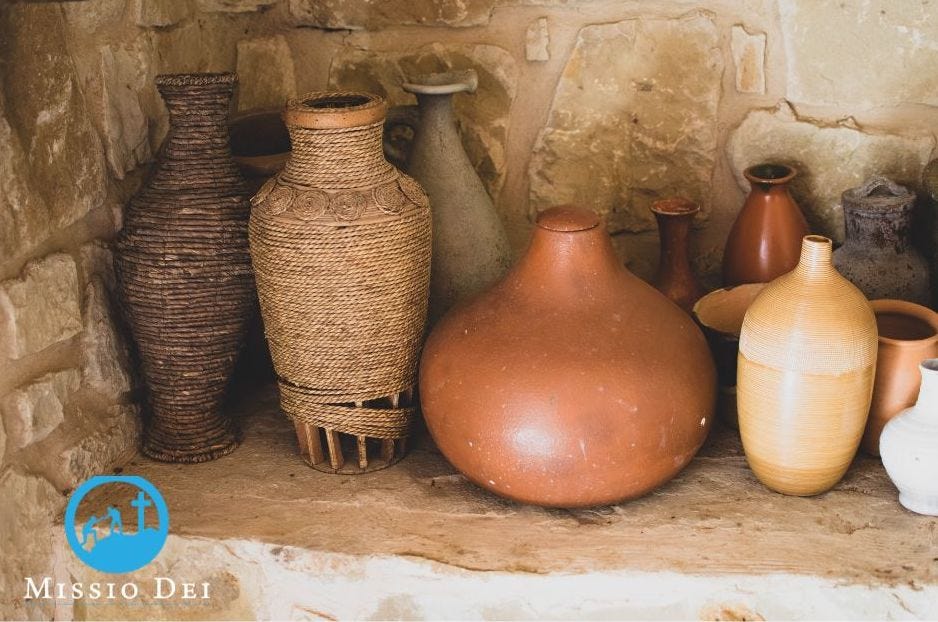We Hold This Treasure in Earthen Vessels
Memorial of Saint Anthony of Padua, Priest and Doctor of the Church, June 13, 2025
We are reminded by the words of St. Paul and our Lord Jesus in today’s readings that we’re called to live a life of holiness. The Catechism of the Catholic Church explains, “All Christians in any state or walk of life are called to the fullness of Christian life and to the perfection of charity.” All are called to holiness: “Be perfect, as your heavenly Father is perfect.”1
Our Protestant Brothers and Sisters will tell us that it is a task that is impossible; they will cite the First Letter of St. John and say to us, “If we say, ‘We are without sin,’ we deceive ourselves, and the truth is not in us. 9 If we acknowledge our sins, he is faithful and just and will forgive our sins and cleanse us from every wrongdoing.”2 The problem, though, is that it seems they do not continue to read the rest of the letter. John tells us later in the same letter, “No one who is begotten by God commits sin, because God’s seed remains in him; he cannot sin because he is begotten by God.”3
Naturally, the Catholic position has always been that the sanctification of our souls is achieved through God’s infusion of grace. It’s not simply, “It is finished,” as the Protestants misquote our Lord. Grace is not imputed like snow covering dung, as Martin Luther put it. There is no simultaneously justified sinner—this contradicts the First Letter of St. John—because “No one who is begotten by God commits sin, because God’s seed remains in him; he cannot sin because he is begotten by God.” So, we can live a life of holiness as Jesus tells his disciples, “So be perfect, just as your heavenly Father is perfect.”4
In our gospel for today, Jesus presents each of us with a challenging lesson on the sin of lust and the importance of cultivating the virtue of chastity. Our Lord teaches us:
You have heard that it was said, ‘You shall not commit adultery.’ But I say to you, everyone who looks at a woman with lust has already committed adultery with her in his heart. If your right eye causes you to sin, tear it out and throw it away. It is better for you to lose one of your members than to have your whole body thrown into Gehenna. And if your right hand causes you to sin, cut it off and throw it away. It is better for you to lose one of your members than to have your whole body go into Gehenna.5
Many biblical commentators will note the traditional form of Jesus’ teaching, which often employs hyperbole; however, they should not minimize the significance of Jesus’ words. The starkness of Jesus’ words is meant to illustrate the seriousness of sin. It is not simply “It is finished,” and now you can keep sinning—No! If you continue in your sins, you will go to the fires of Gehenna, hell. St. Paul explains to the Romans that to live a Christian life is to live one without sin:
"What then? Shall we sin because we are not under the law but under grace? Of course not! Do you not know that if you present yourselves to someone as obedient slaves, you are slaves of the one you obey, either of sin, which leads to death, or of obedience, which leads to righteousness? But thanks be to God that, although you were once slaves of sin, you have become obedient from the heart to the pattern of teaching to which you were entrusted.6
So, then, how is it possible for us to live a life of holiness? How is it possible to stop sinning? The disciples, bewildered at Jesus’ teaching on the dangers of materialism later in Matthew’s Gospel, pose the question, “Who, then, can be saved?” Jesus replies to them, “Jesus looked at them and said, ‘For human beings this is impossible, but for God all things are possible.”7
How is it possible? Only by God’s grace—the gift of faith to be made holy, the grace to sustain it—is it possible to live a life of holiness. St. Paul echoes that in today’s first reading.
We hold this treasure in earthen vessels,
that the surpassing power may be of God and not from us.
We are afflicted in every way, but not constrained;
perplexed, but not driven to despair;
persecuted, but not abandoned;
struck down, but not destroyed;
2 Corinthians 4:8-9
The Catechism of the Catholic Church reminds us that “The way of perfection passes by way of the Cross. There is no holiness without renunciation and spiritual battle,” and “The children of our holy mother the Church rightly hope for the grace of final perseverance and the recompense of God their Father for the good works accomplished with his grace in communion with Jesus.”8
Our earthly pilgrimage toward the Kingdom of Heaven is a difficult one filled with pitfalls. We are sanctified and made heirs of the Kingdom by the waters of our Baptism. During our journey, many of us will fall into sin.
Let us hold on to the treasure of sanctifying grace in our earthly vessels. Let us hold fast to the sacramental grace given to us by our Lord Jesus, by the gift of His Church.
Adore God. Pray. Go to Confession. Eat His Body. Be Charitable—Live a Life of Holiness.
Catholic Church, Catechism of the Catholic Church, 2nd Ed. (Washington, DC: United States Catholic Conference, 2000), 488.
1 Jn 1:8-9, NAB-RE
1 Jn 3:9, NAB-RE
Mt 5:48, NAB-RE
Mt. 5:27-30, NAB-RE
Ro 6:15-17, NAB-RE
Mt 19:26
Catholic Church, Catechism of the Catholic Church, 2nd Ed. (Washington, DC: United States Catholic Conference, 2000), 488-489.



Well said!!!!
Sorry, I was not clear. It was about being begotten by God. You have cleared things up. Thanks for your reply.